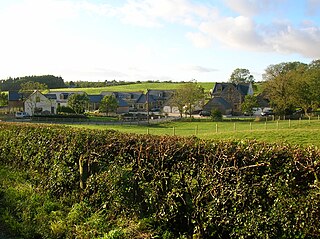Related Research Articles

A straw man fallacy is the informal fallacy of refuting an argument different from the one actually under discussion, while not recognizing or acknowledging the distinction. One who engages in this fallacy is said to be "attacking a straw man".

Charles Lamb was an English essayist, poet, and antiquarian, best known for his Essays of Elia and for the children's book Tales from Shakespeare, co-authored with his sister, Mary Lamb (1764–1847).

The Irish Terrier is a dog breed from Ireland, one of many breeds of terrier. The Irish Terrier is considered one of the oldest terrier breeds. The Dublin dog show in 1873 was the first to provide a separate class for Irish Terriers. By the 1880s, Irish Terriers were the fourth most popular breed in Great Britain and Ireland.

Mary Anne Lamb was an English writer. She is best known for the collaboration with her brother Charles on the collection Tales from Shakespeare (1807). Mary suffered from mental illness, and in 1796, aged 31, she stabbed her mother to death during a mental breakdown. She was confined to mental facilities for most of her remaining life. She and Charles presided over a literary circle in London that included the poets William Wordsworth and Samuel Taylor Coleridge, among others.
"The Water Is Wide" is a folk song of British origin. It remains popular in the 21st century. Cecil Sharp published the song in Folk Songs From Somerset (1906).
Essays of Elia is a collection of essays written by Charles Lamb; it was first published in book form in 1823, with a second volume, Last Essays of Elia, issued in 1833 by the publisher Edward Moxon.

The following is a discography of songs with production and writing credits from American woman rapper Missy Elliott, sorted by album, date, and title.
Jaroslav Vajda was an American hymnist.
Charles William Murphy was a prolific British composer of music hall and musical theatre tunes.
Lord Saltoun and Auchanachie, also known as Annachie Gordon, is a Scottish ballad.
"Pomona" is a folksong originating from Manchester. It has many similarities with a song called Lamorna, which is popular in Cornwall.

Mary "Mamie" Dickens was the eldest daughter of the English novelist Charles Dickens and his wife Catherine. She wrote a book of reminiscences about her father, and in conjunction with her aunt, Georgina Hogarth, she edited the first collection of his letters.
Dora Annie Dickens was the infant daughter of English novelist Charles Dickens and his wife Catherine. She was the ninth of their ten children, and the youngest of their three daughters.
Steven Jay Nathan is an American keyboardist. He is known for his session work in Muscle Shoals and Nashville studios.

Handsome Nell was the first song written by Robert Burns, often treated as a poem, that was first published in the last volume of James Johnson's Scots Musical Museum in 1803 (No.551) with an untitled tune. Burns recorded in holograph on page three of his first Commonplace Book that he wrote the song or Rhyme at the age of only fifteen whilst living at Mount Oliphant Farm, it is regarded as his earliest production, inspired by a farm servant aged fourteen, named either Nelly Kilpatrick or Nelly Blair. Some confusion exists as he also gave his age as 16 in his autobiographical letter to Dr. Moore; the autumn of 1774 is generally accepted.

"The Old Familiar Faces" (1798) is a lyric poem by the English man of letters Charles Lamb. Written in the aftermath of his mother's death and of rifts with old friends, it is a lament for the relationships he had lost. It has long been Lamb's most popular poem, and was included in both The Oxford Book of English Verse and Palgrave's Golden Treasury.
References
- ↑ The Complete Works and Letters of Charles and Mary Lamb. New York: Modern Library, 1935.
- ↑ The Works of Charles and Mary Lamb — Volume 2, Project Gutenberg ebook